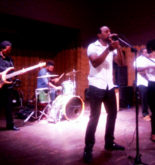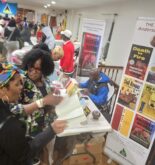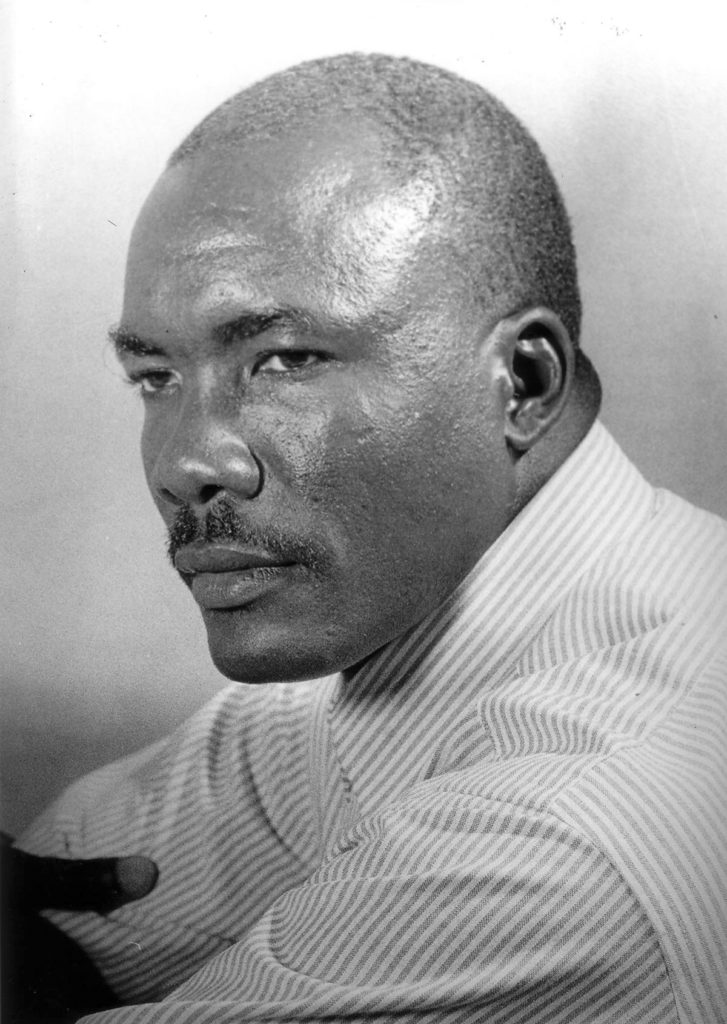
Multiple award-winning Caribbean poet, Modeste Downes, interviewed Dr. Anderson Reynolds shortly before the official release of his fourth and latest book, the memoir,My Father Is No Longer There. Following is a summary of the interview conducted at the poet’s home in Augier, Vieux Fort, St. Lucia.
Modeste Downes: How long have you been writing and what are your major publications to date?
Anderson Reynolds: I have been engaged in creative writing since the early 1990’s. My first substantive piece of writing was a biographical novel, well, more like a memoir, which I didn’t try to publish because I didn’t think it was good enough. However, it has remained my longest piece of writing to date. So far, including My Father Is No Longer There, I have four published books. The other three books being the two novels Death by Fire and The Stall Keeper, and the creative non-fiction,The Struggle for Survival: an historical, political and socioeconomic perspective of St. Lucia.
Modeste Downes: What motivates your writing?
Anderson Reynolds: I am very much taken by the beauty, history and culture of St. Lucia. So part of the motivation for my writing is my desire to capture as much of the history and culture of my country as possible. I’m always striving to capture the essence of who we are as a people, where we came from, what forces have shaped our existence, that account for who we are. In most of my writings this is part of what I set out to do.
Modeste Downes: Your background is academics. You hold a PhD in Agricultural Economics from the University of Florida, so what made you turn to creative writing, be it fiction or nonfiction?
Anderson Reynolds: Mytraining and profession as an economist came about through external forces. My Father was a part-time farmer and we his children were an integral part of his labor force, so it wasn’t surprising that in St. Lucia I ended up pursuing a diploma in general agriculture, and in college in the U.S. I specialized in agricultural economics. In contrast, the creative writing is coming from the heart,it gives expression to what’s inside me, and it enables me to capture the history, culture, and beauty of my country. From childhood I have always been enchanted with the beauty of St.Lucia, its people, its culture, its possible future.
Modeste Downes: It seems that you are quite adept at moving between fiction and non-fiction. So far you have written two novels, and two creative non-fictions, which is easier for you to write?
Anderson Reynolds: As far as which is easier, fiction or creative nonfiction, it’s a mixed bag. The fiction is challenging in that most of it has to be dreamed up, but interestingly once I start to write, things flow quite readily, quite nicely; one chapter leads to the other, and the book seems to find its own structure. On the other hand, the material for the nonfiction already exists, so it’s a matter of research and deciding what to include, but the material is never able to flow as easily as that of the novels, therefore structuring the nonfiction for the book to read like a whole is always very challenging, and I’m never sure that I got it right.
Modeste Downes: What prompted the writing of My Father Is No Longer There?
Anderson Reynolds: My father was killed in a vehicular accident while on his early morning walk. He was 78 and in good health.
All my books so far have been sparked by incidents, especially those occurring in my childhood, that left a lasting impression on me. In Death by Fire it was a double murder at a time (Iwas a teenager then) when murders were unheard of in St. Lucia. In The Stall Keeper it was an entrepreneur and a very colorful character who rose from nothing to build a successful retail business, only for a fire to destroy it all (I was a preteen when this occurred). In The Struggle For Survival it was the 1993 island-wide banana strike that culminated in the shooting death of two farmers by police officers. I was already a mature adult, but the incident left me and the rest of the island in shock and led to the transformation and liberalization of the banana industry.
My father’s sudden and accidental death would have left just as much or an even greater impact on me than these previous incidences, so I knew that to get any kind of peace of mind I had to write about him and his death, meaning unless I write something the idea will keep nagging at me. But then I did not know whether I was just going to write an essay or a book, I just knew I had to write. Furthermore, I didn’t feel I Knew my father as much as a son should know his father. So writing about my father was maybe a way of reconciling myself to his death and getting to know him better, because writing about him invariably meant spending more time with him, thinking about him, exploring his life.
Modeste Downes: So then did writing the book provide you with the emotional closure you were seeking, did it bring you some level of peace of mind?
Anderson Reynolds: This is a difficult question to answer because I’m not sure where the truth of it lies.It was very difficult to come to terms with my father’s sudden death. At first there was denial, as if this had happened to someone else and not to me, as if none of it was real. Only time seems to have lessened the pain, allowed reality to set in little by little until I had arrived at a point where I could morefully accept the reality of it all.
But writing about my father channeled the despairing energy into something positive and creative, it helped in making sense, or at least getting a better handle on my father’s senseless death. It allowed me to focus not just on my father’s death (something negative) but also on his life, my life, and to a lesser extent those of my siblings (something positive). However, even today, upon rereading the book, I’m not sure whether the exercise brings solace or is simply reopening old wounds. Of course, in the process of rewriting and editing, I read the work somany times that it became as if I’m writing about a third person and his father and family, as if it is fiction.
Modeste Downes: Religion, Seventh Day Adventism, to be exact, seems to have played a big role in your family and in your father’s life, and as to be expected in My Father Is No Longer There. You have said that Seventh Day Adventist alienated you from your indigenous St. Lucian culture, is that true of all Seventh Day Adventists, oris it more idiosyncratic than that.
Anderson Reynolds: The Answer is yes and no. As you know, St. Lucia is the most Roman Catholic of the English-speaking Caribbean. When I was growing up, I suspect more than 90 percent of the population was Roman Catholic, so as Adventist we were a tiny minority, in fact we were probably a minority even among protestant denominations.
The Adventist regarded most things that had to do with the popular culture of the country as things of the world and therefore out of reach. That included most of its music, bazaars, cinema, carnival and other festivals.Imagine that I was 15 and couldn’t differentiate between soca, cadence and calypso, it was to my 12-year-old non-Adventist friend I had to turn for clarification.
So at the time, the alienation applied to all Adventists, in that regard we were not far from being a sect or a cult. But in Vieux Fort, my hometown, the alienation was more pronounced on my family than other Adventists because my father wasn’t only the elder of the church and its main preacher but was close to being one of the founding fathers of the church in the South of the island. So all eyes were on my father and his family, we were the epitome of Adventism in St. Lucia, more so in the South. We Were like Adventist royalty.
However, since Adventism and other protestant churches have grown tremendously and have made inroads into the territory of the Catholic Church, Adventism have now become more mainstream and much less isolated and alienated from the general population and popular culture. And, of course, the advent of cell phones, tablets, and ubiquitous WiFi has meant that parents have less control over what their children access and share.
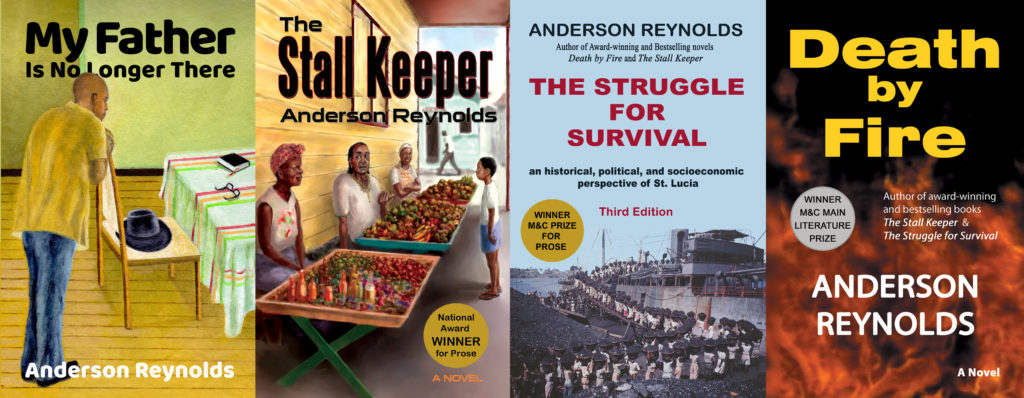
Modeste Downes: Would it be correct to say that My Father Is No Longer There is different than anything you have written so far? And what distinguishes it from your other works?
Anderson Reynolds: I would have to say yes. Death by Fire and The Stall Keeper are novels, largely made up. The Struggle for Survival is really a historical account, it gives a slice of St. Lucia’s history, and it is a statement on the current state of the island’s economic and social health, and a look into its future. But My Father Is No Longer There is much closer to home, much more personal, much more intimate, for it is a memoir focusing on my father, speaking about my family,dwelling on my childhood disposition.
Modeste Downes: What, in essence, is the focal point of the book? Is there a message it seeks to convey?
Anderson Reynolds: Difficult Question. However, in terms of the main character, the main focus, the answer is easy, it’s my father. But in terms of theme, intended messages, the book wasn’t written with the purpose of conveying a specific message or a set of messages. Nonetheless it speaks to a number of themes, or there are several talking points, including what is the value of a life; a family’s struggle to survive, to better itself; the depths of parental love and sacrifice; the value and necessity of education; the nature of death; the consequences of severed mother-child bonding; the nature of art and creativity.
Modeste Downes: You Undertook the fairly unusual task to write a book about your father’s tragic death. What was the mood, what special feelings/emotions were evoked in you during the writing? Were there times you wondered whether you should be doing this?
Anderson Reynolds: Writing This memoir was a very difficult exercise, for it was painful and emotionally draining, each re-reading of it seems to open old wounds. Because of the emotional pain involved, I had to write the book in small bites. So it was written quite slowly. During the whole process and long after the first draft,I wasn’t sure of the prudency of publishing the book. As a result, it sat around for years, during which I would reread it every so often, trying to decide whether it deserved to be published, and, even so, given the intimacy of the material, whether it should be published, especially since I was concerned about my family’s reaction to it.
Sometimes people write such books to lash out, to seek revenge, to try to right perceived wrongs, to tell it all.But since this was in no way the reason why I wrote the book (writing it was simply an exercise of turning pain and tragedy into art), you can well understand my concern about not wanting to cause my family undue pain or discomfort. Although the book is now published, I’m still unsure of whether I did the right thing. I feel in writing and offering the book for publication, I have sacrificed myself for the purpose of art and sharing with the world what Ithink is a unique and compelling story. I’m waiting with trepidation.
Modeste Downes: Your Mother—your dad’s wife—survives your dad; so do all your brothers and sisters.What reactions from them to the book?
Anderson Reynolds: Only one of my siblings read drafts of the book. He is my immediate junior and an economic college professor. He didn’t have any strong objections. However, he thought that based on what’s in the book I’m the one at greatest risk, meaning what I said about myself was the most revealing. Now that the book is out, I’m Waiting apprehensively for the responses of the rest of my siblings and close cousins. As for my mother, her level of schooling wouldn’t allow her to properly access the book, more so now that she is bedridden.
Modeste Downes: You’ve cited the recently deceased (August 8) American Nobel Laureate Toni Morrison as one of your favorite writers. Has her writing influenced yours in any way? Or, is there another writer that parallels or comes close to your scripting of My Father Is No Longer There?
Anderson Reynolds: Yes, like the passing of Derek Walcott, Toni Morrison’s passing was indeed a sad occasion for me. She was by far my favorite writer, and more importantly, though we had never met, she was my writing coach, my writing mentor. I have read just about all her books, including her nonfiction, several times and still counting. Why This fascination with Toni Morrison? Well, there are two reasons. First, she has that uncanny ability to get to the bare essentials of an entity, the essentials without which the entity would no longer be what it is, and then she colors those bare essentials so that they become in full view, in the process making the entity more of what it is. Second, Toni Morrison writes the way I think. Just imagine the thrill of reading an author that speaks the way you think. Earlier, I addressed the issue of why Iwrite, well I would like to add that in my writing I want to do for St. Lucia and Caribbean society what Toni Morrison has done for the African American Community.
Let me share a joke with you. When I was living in St. Louis, Missouri, Toni Morrison came to do a book reading and signing. When I got there the line to enter stretched like a marathon, and before I could get in the place was filled, so I didn’t get to see my favorite author and mentor. I was angry (not sure at whom). I said, “look at that, I’m Sure a lot of the people in there have not even read her books, much less fully appreciate her work, and here I am one of her biggest fans, a student of Toni Morrison, and I couldn’t even get a glimpse of her.” My girlfriend who had accompanied me had a good laugh at my expense, she thought my reaction was so funny and childish. Her revenge, I guess, for having had to listen to me yap all the time about Toni Morrison.
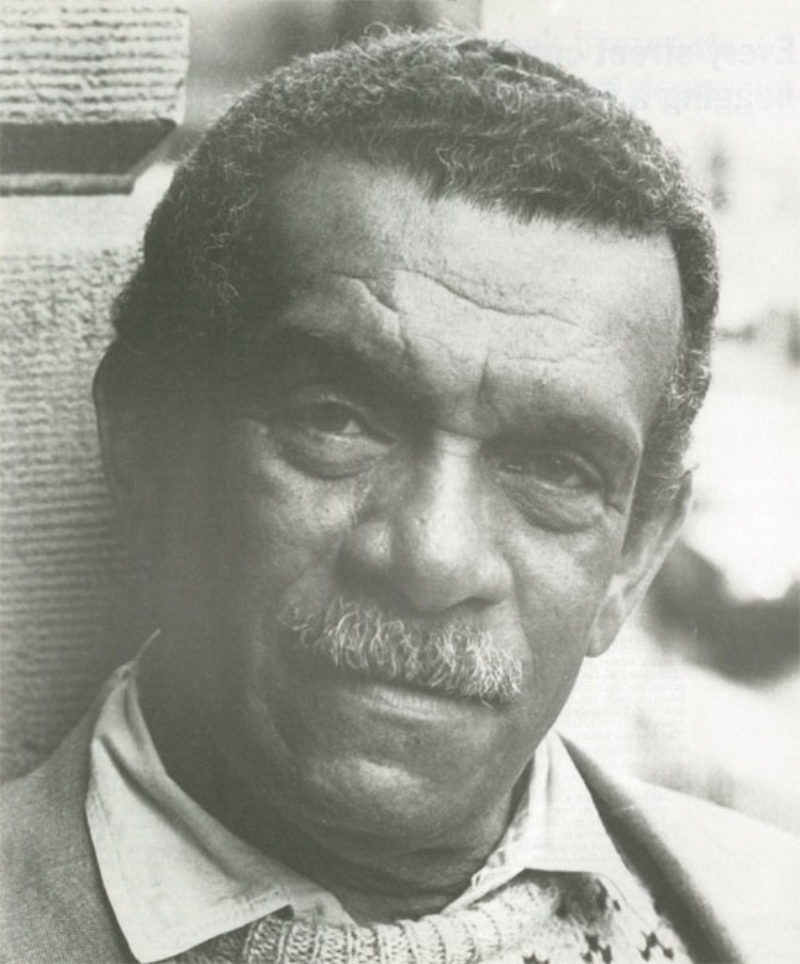
The answer to the last part of the question is, yes, and that would be Jamaica Kincaid, who is at her best when she is writing about her family, her mother especially, whether in memoirs, orin what I consider her thinly disguised autobiographical novels. One of her memoirs, My Brother, is a book about her brother dying of aids, which I had read several years before the death of my father. But as soon as I decided to write about my father, I knew right away that the language and mood of My Brother matched the way I felt. So indeed, Jamaica Kincaid’s work assisted me in the writing of My Father Is No Longer There, both in terms of language,mood, structure, and even theme. For example, it was from My Brother that I got the notion of including the chapter, Why I’m I Writing About My Father, which turned out to be the longest chapter in the book.
Modeste Downes: Is there a special audience the book appeals to, or that you’re targeting?
Anderson Reynolds: With this book, I’m not trying to target any particular audience. My other books are very much tied to place—St. Lucia. They ostensibly set out to capture the history,culture, and socioeconomics of the island. But My Father Is No Longer There is less about a place but about personal tragedy, loss, family values, a family odyssey, a family struggling to put food on the table and striving to give its children the best moral training and education as possible. It represents an instance of turning loss and tragedy into art. It should resonate with all those who have suffered a great loss, be it the death of a loved one, or parent-child separation, or any other heart-wrenching separation.
Modeste Downes: What is the most characteristic feature about your father that is brought out in the narrative, and did you discover things about your father that you didn’t know before.
Anderson Reynolds: He was a man who placed a high value on keeping the peace, even to the extent of tolerating people taking advantage of him. He stood for what was right, he rooted for the underdog, he was a long-sufferer. Though he may tolerate people taking advantage of him, he would not stand by and let people mistreat or take advantage of his love ones. He was a compassionate and forgiving man who loved his family dearly and was totally committed to his family, church, and God. He was a man of quiet confidence and disposition, a man of deep rootedness and forbearance. And I’m pretty sure that many who knew him well would add that he was a man of wisdom and foresight.
In writing about my father it was not so much that I discovered new things about him than that I gained greater clarity about the life he led, acquired a better sense of the man he was, and that I was forced to contemplate on the value of a life, the nature of death, the nature of my family, and to conclude that my family was a family of heroes, none more so than my Dad.
Modeste Downes: Browsing through the text I noted that your father’s death occurred close to the family residence. Any affectation to family life? To you in particular?
Anderson Reynolds: Well, I can only talk for myself. Being so close to home it is a constant reminder,though not necessarily a painful one, of the accident that took my father’s life. I regularly go for walks/runs along the same path my father did. On these things I’m always reminded of my father’s tragedy, and so I take extra precautions, yet at the back of my mind it does occur to me that I might meet the same fate as my father.
The only eye-witness to the accident, also lives close by. In fact, he was involved in the accident. The out of control vehicle that killed my dad had also grazed his vehicle. When I pass by this eye-witness’s home and when I come across him, my father’s death and his involvement in the accident come to mind. I attended the last two years of secondary school with the eye-witness, we were never in the same class and were never close friends, but somehow I feel that we have a special connection,a permanent link connecting us with my father’s death.
Modeste Downes: In the West Indian migration literature, we are often provided with the perspective of the migrating parents but almost never the perspective of the children left behind. Do you think you are breaking a taboo in your book by opening up the topic of the possibly traumatic emotional impact of West Indian labor migration on young children being separated from their mothers’ and/or fathers?
Anderson Reynolds: I’m not sure to what extent it is taboo, but I think that in the decision to migrate and leave young children behind, of which as discussed in the book I was a victim, too little consideration is given to the traumatic impact of the separation on the children.

Now I understand that often times the parents see migration as one of the few available options of better providing for their children and preparing a better place for them. But I think if parents had a better understanding of the lasting damage to their young children of such separations, they might seek alternatives to migration, or they might approach the migration in ways that minimize the disconnection from their children.
In my own extended family, I know of several situations where the parents either left the young children behindor sent the children to St. Lucia to be raised by their grandparents, and the end results have been quite tragic, even when the children were able to reunite with the parents as teenagers. It’s a lesson that can’t be overemphasized.
Modeste Downes: It is said that all great literature essentially is concerned with love and death, do you think that’s true of your book.
Anderson Reynolds: Well, the short answer is, yes. So are you saying that My Father Is No Longer There a great piece literature? Just kidding. The book is about death in that it speaks to my father’s death and the circumstances and events surrounding his death,and it provides a contemplation on the nature of death. It is also about love,not so much romantic love but parental love, familial love.
Modeste Downes: I know that when The Stall Keeper came out in 2017 you went on an international tour,visiting Toronto, London, and several American cities. Do you have similar plans for My Father Is No Longer There?
Anderson Reynolds: Yes, with the publication of My Father Is No Longer There, I plan to do a national tour,conducting book readings and signings in Vieux Fort, Castries, and Soufriere, and possibly other places. I plan to visit most of the island’s Secondary Schools and the primary schools in my home district. Then I would like to visitas many CARICOM countries as is feasible. And since I was very encouraged by my2017 tour, I would like to retrace my steps and visit several North American cities and also several European countries, the UK in particular.
![]()

